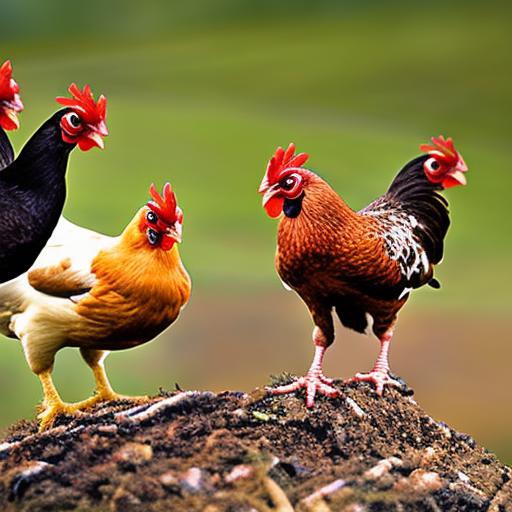Keeping chickens and horses together is a popular practice among many horse owners. Not only does it provide numerous benefits, but it also adds a charming and rustic element to the farm or stable. Personally, I have been keeping chickens with my horses for several years now and have found it to be a rewarding and enjoyable experience. In this article, we will explore the benefits of keeping chickens with horses, factors to consider before doing so, choosing the right chicken breed, coop and run requirements, feeding and watering considerations, health and hygiene considerations, managing interactions between chickens and horses, potential risks and challenges, and finally, some personal recommendations and tips.
Key Takeaways
- Keeping chickens and horses together can have many benefits for both animals.
- Before keeping chickens with horses, it’s important to consider factors such as space, safety, and compatibility.
- Choosing the right chicken breed for your horses is important, as some breeds may be more compatible than others.
- Coop and run requirements for chickens with horses should prioritize safety and protection from predators.
- Feeding and watering chickens with horses should be done separately to prevent competition and potential health issues.
Benefits of keeping chickens with horses
One of the main benefits of keeping chickens with horses is natural pest control. Chickens are excellent at foraging for insects such as flies, ticks, and mosquitoes. They will eagerly peck at these pests, reducing their numbers and providing relief for your horses. This can be especially beneficial during the summer months when flies are abundant. Additionally, chickens can help control other pests such as mice and rats that may be attracted to the horse feed.
Another benefit is fertilization of pastures. Chickens produce manure that is high in nitrogen, phosphorus, and potassium – essential nutrients for healthy pasture growth. As they roam around the horse pasture, they will naturally spread their manure, enriching the soil and promoting lush grass growth. This can help reduce the need for chemical fertilizers and improve the overall health of your pasture.
Companionship is another advantage of keeping chickens with horses. Horses are social animals and can benefit from having other animals around them. Chickens can provide entertainment and companionship for horses, especially if they are kept in close proximity. Horses may enjoy watching the chickens pecking around or even interacting with them through the fence. This can help alleviate boredom and reduce stress for the horses.
Lastly, keeping chickens with horses can provide fresh eggs for humans. Many chicken breeds are excellent layers and can provide a steady supply of eggs for your household. Not only are fresh eggs delicious, but they are also packed with nutrients and can be a valuable addition to your diet. Plus, there is something incredibly satisfying about collecting eggs from your own backyard.
Factors to consider before keeping chickens with horses
Before deciding to keep chickens with horses, there are several factors that need to be considered. First and foremost, it is important to check local zoning laws and regulations regarding the keeping of chickens. Some areas may have restrictions on the number of chickens allowed or require specific permits. It is essential to comply with these regulations to avoid any legal issues.
Space availability is another important factor to consider. Chickens require adequate space to roam and forage. Ideally, they should have access to a fenced-in run or pasture area where they can scratch and peck. Additionally, you will need to ensure that there is enough space for a chicken coop and nesting boxes. It is important to provide enough space for both the chickens and the horses to ensure their comfort and well-being.
Keeping chickens with horses also requires a time commitment. Chickens need daily care, including feeding, watering, cleaning the coop, and collecting eggs. It is important to assess whether you have the time and resources to properly care for both the horses and the chickens. If you have a busy schedule or travel frequently, it may be more challenging to maintain both animals.
Predators in the area should also be taken into consideration. Chickens are vulnerable to predators such as foxes, raccoons, and hawks. It is important to assess the risk of predation in your area and take appropriate measures to protect your chickens. This may include installing secure fencing, using predator deterrents such as motion-activated lights or noise devices, and providing a safe and secure coop for the chickens to roost at night.
Choosing the right chicken breed for your horses
When choosing a chicken breed to keep with your horses, there are several factors to consider. First and foremost, it is important to select breeds that are calm and docile. Horses can be easily startled by sudden movements or loud noises, so it is important to choose chickens that are not overly flighty or aggressive. Breeds such as Buff Orpingtons, Australorps, and Silkies are known for their calm and friendly temperament.
Breeds that are good foragers are also ideal for keeping with horses. These chickens will actively search for insects and other pests in the pasture, reducing the need for chemical pest control methods. Breeds such as Rhode Island Reds, Sussex, and Plymouth Rocks are known for their excellent foraging abilities.
Cold-hardy breeds are also important if you live in an area with harsh winters. These chickens will be able to withstand cold temperatures and continue laying eggs throughout the winter months. Breeds such as Barred Rocks, Wyandottes, and Orpingtons are known for their cold tolerance.
It is important to research different chicken breeds and their specific characteristics to determine which ones will be the best fit for your horses and your climate.
Coop and run requirements for chickens with horses
Providing a suitable coop and run is essential for keeping chickens with horses. The size and design of the coop will depend on the number of chickens you plan to keep. As a general rule of thumb, each chicken should have at least 4 square feet of coop space. The coop should be well-ventilated, secure from predators, and provide nesting boxes for the hens to lay their eggs.
The location of the coop in relation to the horse pasture is also important. It is best to place the coop in an area that is easily accessible for you to care for the chickens, but also away from the horse pasture to minimize any potential health risks. Chicken manure can contain bacteria and parasites that may be harmful to horses if ingested. Placing the coop at a distance from the horse pasture can help reduce the risk of disease transmission.
Fencing requirements for the run will depend on the predators in your area. It is important to use fencing that is secure and predator-proof. This may include burying the fencing underground to prevent predators from digging under, using hardware cloth instead of chicken wire, and ensuring that there are no gaps or holes in the fencing that predators can squeeze through. Additionally, it is important to provide a covered area within the run to protect the chickens from aerial predators such as hawks.
Feeding and watering chickens with horses

Chickens have specific dietary requirements that need to be met in order for them to thrive. They require a balanced diet that includes a combination of grains, protein, vitamins, and minerals. There are various types of chicken feed available on the market, including pellets, crumbles, and mash. It is important to choose a feed that is appropriate for your chickens’ age and stage of production (e., laying or non-laying).
In addition to their regular feed, chickens also benefit from supplements such as oyster shell or crushed eggshells for calcium, grit for digestion, and probiotics for gut health. These supplements can help ensure that your chickens are getting all the nutrients they need to stay healthy.
Watering requirements for chickens are also important to consider. Chickens require fresh and clean water at all times. It is important to provide them with a constant supply of water in a clean container that is easily accessible. During hot weather, it may be necessary to provide shade or misters to help keep the chickens cool and prevent dehydration.
Feeding schedules will depend on the age and stage of production of your chickens. Chicks require frequent feedings throughout the day, while adult chickens can be fed once or twice a day. It is important to establish a feeding routine and stick to it to ensure that your chickens are getting the proper nutrition.
Health and hygiene considerations for chickens with horses
Maintaining the health and hygiene of your chickens is essential for their well-being and the well-being of your horses. Regular cleaning of the coop and run is important to prevent the buildup of bacteria, parasites, and odors. The coop should be cleaned at least once a week, with soiled bedding removed and replaced with fresh bedding. The run should also be cleaned regularly to remove any droppings or debris.
Parasite prevention and treatment is another important aspect of chicken care. Chickens can be susceptible to external parasites such as mites and lice, as well as internal parasites such as worms. It is important to establish a regular parasite prevention program that includes regular inspections, dust baths, and appropriate treatments if necessary. Consult with a veterinarian or poultry expert for guidance on parasite prevention and treatment options.
Biosecurity measures should also be implemented to prevent the spread of diseases. This includes quarantining new chickens before introducing them to the existing flock, practicing good hygiene when handling chickens or their eggs, and preventing contact between wild birds and your chickens. It is important to be vigilant and proactive in preventing the spread of diseases to ensure the health of your flock.
Managing chicken and horse interactions
Introducing chickens to horses should be done gradually and with caution. Horses may be curious or even fearful of the new additions, so it is important to allow them time to adjust. Start by placing the chickens in a separate area where they can see and hear the horses but are not in direct contact. This will allow both animals to become familiar with each other’s presence.
Monitor interactions between chickens and horses closely. Some horses may be more accepting of the chickens, while others may be more aggressive or territorial. It is important to observe how the horses react to the chickens and intervene if necessary. If a horse shows signs of aggression or becomes overly stressed, it may be necessary to separate the chickens and horses.
Separating chickens and horses may be necessary in certain situations. For example, if a horse becomes overly aggressive towards the chickens or if a chicken is injured by a horse, it may be best to keep them separated for their safety. It is important to prioritize the well-being of both animals and make decisions based on their individual needs.
Potential risks and challenges of keeping chickens with horses
While keeping chickens with horses can be a rewarding experience, there are potential risks and challenges that need to be considered. One of the main risks is disease transmission. Chickens can carry diseases such as avian influenza or salmonella, which can be transmitted to horses through contact with contaminated feces or bedding. It is important to practice good hygiene and biosecurity measures to minimize the risk of disease transmission.
Predation is another potential risk when keeping chickens with horses. Predators such as foxes, raccoons, or hawks may see the chickens as easy prey. It is important to take appropriate measures to protect your chickens from predators, such as secure fencing, predator deterrents, and providing a safe and secure coop for them to roost at night.
Aggressive behavior from either the horses or the chickens can also pose a challenge. Some horses may become territorial or aggressive towards the chickens, while some chicken breeds may exhibit aggressive behavior towards the horses. It is important to monitor interactions closely and intervene if necessary to prevent any injuries or stress.
Conclusion and final thoughts on keeping chickens with horses
In conclusion, keeping chickens with horses can provide numerous benefits, including natural pest control, fertilization of pastures, companionship for horses, and fresh eggs for humans. However, there are several factors to consider before embarking on this endeavor, including local zoning laws, space availability, time commitment, and predators in the area. Choosing the right chicken breed, providing a suitable coop and run, and ensuring proper feeding and watering are also important considerations. Health and hygiene considerations, managing interactions between chickens and horses, and potential risks such as disease transmission or predation should also be taken into account. Despite the challenges, keeping chickens with horses can be a rewarding and enjoyable experience that adds a unique charm to your farm or stable.
If you’re wondering whether you can keep chickens with horses, you’ll be interested in this informative article on Poultry Wizard. They have a great resource on creating the perfect chicken coop for your equine friends. Check out their article on “Hannah Montana Chicken Coop” to learn more about how to design a coop that is safe and comfortable for both chickens and horses. With tips on chicken coop interior ideas and even chicken coop portage, Poultry Wizard has all the information you need to successfully integrate these two animals. Read more here.
FAQs
What are the benefits of keeping chickens with horses?
Keeping chickens with horses can provide several benefits. Chickens can help control pests such as flies and ticks, and their manure can be used as fertilizer for the pasture. Additionally, chickens can provide fresh eggs for the owner.
Is it safe to keep chickens with horses?
Yes, it is generally safe to keep chickens with horses. However, it is important to ensure that the chickens have a separate area to roost and lay eggs to prevent them from being trampled by the horses.
What should be considered when keeping chickens with horses?
When keeping chickens with horses, it is important to ensure that the chickens have access to clean water and food, and that their coop is secure from predators. Additionally, it is important to monitor the horses for any signs of aggression towards the chickens.
Can horses and chickens share the same pasture?
Yes, horses and chickens can share the same pasture. However, it is important to ensure that the chickens have a separate area to roost and lay eggs to prevent them from being trampled by the horses.
What type of chickens are best to keep with horses?
Any breed of chicken can be kept with horses. However, it is important to choose a breed that is hardy and can withstand the outdoor environment. Additionally, it is important to choose a breed that is not aggressive towards other animals.
Meet Walter, the feathered-friend fanatic of Florida! Nestled in the sunshine state, Walter struts through life with his feathered companions, clucking his way to happiness. With a coop that’s fancier than a five-star hotel, he’s the Don Juan of the chicken world. When he’s not teaching his hens to do the cha-cha, you’ll find him in a heated debate with his prized rooster, Sir Clucks-a-Lot. Walter’s poultry passion is no yolk; he’s the sunny-side-up guy you never knew you needed in your flock of friends!







